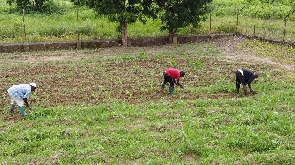Mr. Augustine Tophy, Crops Officer at the Tarkwa-Nsuaem Municipality, has entreated farmers to adopt smart agricultural practices to increase their yield.
According to him, agriculture in Ghana was heavily reliant on natural weather and climate change constituted a big threat to the sector.
"Many people in the country currently knew they were facing climate change. For instance, where farmers needed rain or sunshine it would not be there and that has created problems for our farmers," Mr. Tophy observed
The Crops Officer gave the advice at Akyempim, when the Africa Centre for Energy Policy (ACEP), an energy and extractive policy think tank together with Friends of the Nation (FoN), a socio-environmental advocacy non-government organization, organized a one-day training workshop to sensitize some stakeholders in the Tarkwa-Nsuaem Municipality on Ghana's National Climate Change Policy (NCCP) and the National Climate Adaptation Plan (NCAP).
Mr. Tophy also encouraged farmers not to litter the environment with plastic waste, weed their farms regularly, avoid farming along River banks, control pests and diseases as well as plant early maturing and high-yielding varieties.
"After spraying your farms do not empty your spraying machines into River bodies because farmers downstream may be using them. Take up these measures and improve your farming activities" he added.
Mr. Charles Ofori, Policy Lead on Climate Change and Energy Transition, ACEP, emphasized that the workshop intended to create awareness of climate change concerns and disaster management within the Tarkwa-Nsuaem Municipality.
He said it also aimed to provide practical solutions for residents in the municipality to build resilience against the environmental impacts of mining and climate change.
Mr. Ofori said they would be holding more such programmes to ensure that the climate concerns that they highlighted were not just centered in Accra but rather localized and brought down for people to understand and appreciate some of the harmful effects associated with climate change.
"The program has been participatory and l have learned a lot about good agriculture practices from our farmers. l hope our participants would put what they have studied to use"
Business News of Saturday, 17 December 2022
Source: GNA













